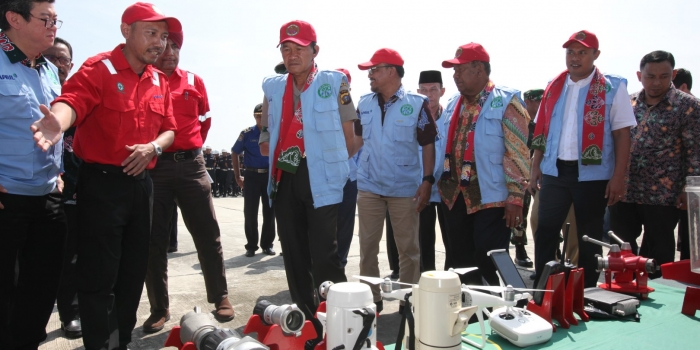Towards Sustainable Fashion: Of Scale, Change and Dialogue
"Change is now coming from Asia. Don't be arrogant. Reach out to Asia" - Erik Solheim. The themes of scale, change and dialogue were a common thread that ran through...

Latest updates on what's happening in RGE Group

On 26 July 2018, leading pulp and paper producer APRIL celebrated the fourth anniversary of its successful Fire-Free Village Programme (FFVP). An evolution of the Village Incentive Programme in 2014, the initiative seeks to engage communities as an on-the-ground approach to address the problem of fire and haze in Indonesia. The event was attended by various stakeholders including representatives from Indonesia’s regional government, military, police, community leaders and members of the media.
In its 2017 review of the programme, independent NGO Carbon Conservation said, “Significant improvements have been recorded since the 2014 commencement of FFVP, with 159 hectares of total burnt land over an area of 622,112 hectares recorded in 2017, compared to 618 hectares of total burnt land over an area of 352,146 hectares in 2014. This represents an overall reduction of 97% of burnt land since 2014.”
From Challenge to Opportunity
Solving the fires that scorch Indonesia’s landscape is no easy task. Historically and culturally, fire has been used a land management tool to clear and prepare land for agricultural use.
What FFVP does is to turn the problem on its head – of seeing communities as part of the solution and not merely as the origin of the problem.
Communities surrounding the company’s concession areas are evaluated based on their risk profile. They then undergo three phases of engagement: Fire Aware Communities (FAC), FFVP, and Fire Resilient Communities (FRC).
FACs focuses on relationship building and allows APRIL to understand community needs and challenges better. This introductory phase also allows the company to conduct school awareness programmes to highlight the negative impact of burning.
This is succeeded by a two-year participation in FFVP, a phase that comprises five key projects
Constant Presence, Promised Reward
No longer estranged from companies, communities participating in FFVP are provided with several touchpoints.
From the moment community leaders sign the MOU with APRIL, someone in the village takes on the role as the village crew leader who acts as a constant reminder to the community’s commitment.
APRIL’s Strategic Fire & Protection Manager Craig Tribolet shares how these crew leaders are an invaluable part of the programme. “We are heartened to see village crew leaders taking a very pro-active approach in their roles. Some go around reminding people that they can’t burn. Others ask community members to sign a piece of paper, pledging that they will not burn for that year. Nothing beats having someone on the ground, in the village telling you ‘You can’t use fire.’”
Air quality monitors are also set up in villages and nearby concession areas to help provide data and evidence for compliance or non-compliance.
The company also provides communities’ access to alternative and environmentally friendly approaches to land clearing. This is supplemented with training community members with more efficient and sustainable way of managing their agricultural crops.
Lastly, both the promise and the presence of the reward is a powerful negotiation tool. “As an alternative to cash rewards, what we give is funding for much needed community infrastructure such as a place of worship, a bridge, a market place. These rewards are identified in close consultation to the community,” shares Tribolet.
Carbon Conservation also noted the advantage of receiving the rewards, “For later stage FFVP communities that achieve reward statuses, the highly-visible provision of new infrastructure benefiting the entire community is a powerful mechanism to encourage continued cooperation.”
Click here to read the full report.